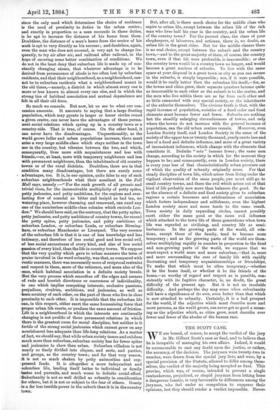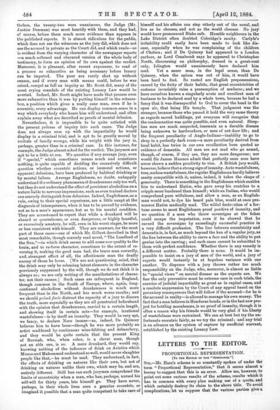THE SCOTT CASE.
Ware bound, of course, to accept the verdict of the jury in in' Mr. Gilbert Scott's case as final, and to believe that he is incapable of managing his own affairs. Indeed, it would be unreasonable to east any doubt upon the justice, or rather, the accuracy, of the decision. The jurymen were twenty-two in number, were drawn from the special jury lists, and were, by a special provision of the Statute, allowed to differ among them- selves, the verdict of the majority being accepted as final. This proviso, which was, of course, intended to prevent a single cantankerous, prejudiced, or stupid juryman from letting loose a dangerous lunatic, is very favourable to differences among the jurymen, who feel under no compulsion to suppress their opinions, lest they should render a verdict impossible. Never-
theless, the twenty-two were unanimous, the Judge (Mr. Justice Denman) was most heartily with them, and they had, of course, before them much more evidence than appears in the published reports. It is almost ridiculous for the public, which does not see the witnesses as the jury did, which does not see the accused in private as the Court did, and which reads—as is evident from the varying character of the newspaper reports —a much softened and obscured version of the whole body of testimony, to form an opinion of its own against the verdict. Moreover, it is pleasant, after recent exposures, to read of a process so exhaustive as being necessary before lunacy can be imputed. The poor are rarely shut up without reason, and if every man with means could, before he was seized, compel as full an inquiry as Mr. Scott did, many of the most crying scandals of the existing Lunacy Law would be averted. Indeed, Mr. Scott might have made that process even more exhaustive than it was by putting himself in the witness- box, a position which gives a really sane man, even if he is eccentric, every advantage. He can display common-sense in a way which everybody who hears him will understand, and often explain away what are described as proofs of mental delusion.
Nevertheless, it is impossible to be quite satisfied with the present process of inquiry into such cases. The Judge does not always sum up with the impartiality he would display in a criminal trial, and is apt to be greatly moved by recitals of family wrongs, while his weight with the jury is, perhaps, greater than in a criminal case. In this instance, for example, the Judge almost asked for the verdict. The jurymen are apt to be a little at sea. We question if any average jury, even if "special," which sometimes means much and sometimes nothing, is quite capable of deciding the excessively difficult question whether eccentric actions, or immoral actions, or apparent delusions, have been produced by habitual drinking or by mental failure. Average Englishmen, no doubt, unhappily understand the ordinary phenomena of drunkenness only too well, but they do not understand the effect of persistent alcoholism on a nature liable to nervous impressions, such as even trained doctors can scarcely distinguish from delusions. Indeed, Englishmen, as a rule, owing to tbeir special experience, are a little unapt at the diagnosis of intemperance, when it has to be proved by evidence, not as to a man's appearance, but as to his mental condition. They are accustomed to expect that while a drunkard will be absurd or quarrelsome, or even dangerous, or highly boastful, or excessively amatory, he will, even in his worst stages, be more or less consistent with himself. They are unaware, for the most part of those cases—one of which Mr. Gilbert described in that most remarkable, though scarcely read novel, "The Landlord of the Sun,"—in which drink seems to add some new quality to the brain, and to re-form character, sometimes to the extent of re- versing it, making the good man bad, the brave man cowardly, and, strangest effect of all, the affectionate man the deadly .enemy of those he loves. [We are not questioning, mind, that the drink may only be releasing latent elements in the character previously suppressed by the will, though we do not think it is -always so; we are only writing of the manifestations of charac- ter, not their causes.] Such cases are infrequent in England, -though common in the South of Europe, where, again, long- continued alcoholism without drunkenness is much more frequent than in the North, and has much worse results ; and we should primii fade distrust the capacity of a jury to discern -the truth, more especially as they are all penetrated beforehand with the opinion that drunkenness, carried to a certain length, and showing itself in certain acts—for example, irrational wastefulness—is by itself an insanity. They would be very apt, we fancy, to declare Nero insane—as, indeed, De Quincey believes him to have been—though he was more probably an artist maddened by continuous wine-bibbing and debauchery, and they would be quite certain that the present King of Burmah, who, when sober, is a clever man, though not an able one, is so. A mere drunkard, they would say, knowing nothing of the influence of drink on Asiatics which Munoo and Mahommed understood so well, would never slaughter people like that,—he must be mad. They understand, in fact, the effects of drinking on natures like their own, but not of drinking on natures unlike their own, which may be, and are, entirely different. Still less can such jurymen comprehend the limits of eccentricity when a man, who has, perhaps, nursed his self-will for thirty years, lets himself go. They have never, perhaps, in their whole lives seen a genuine eccentric, or imagined it possible that a man quite competent to take care of himself and his affairs can step utterly out of the usual, and live as he chooses, and not as the world chooses. No jury would have pronounced Blake safe. Humble neighbours in the Lake District often doubted Coleridge's sanity. Carlyle's irritability could easily have been made to look like dis- ease, especially when be was complaining of the children of Chelsea; and if De Quincey had appeared in a London parlour, as Lord Cranbrook says he appeared to Christopher North, discoursing on philosophy, dressed in a great-coat only, Islington would unanimously have declared him mad. Yet a saner man, in the legal sense, than De Quincey, when the opium was out of him, it would have been hard to find. So rooted are English prepossessions, caused by the fixity of their habits, that great eccentricities of costume invariably raise a presumption of madness ; and we have ourselves known a singularly acute and excellent man of business to be declared mad by a whole town, because he had a fancy that it was disrespectful to God to cover the head in the open air, that being His temple. That judgment was the stranger, because those who passed it hold the very same theory as regards sacred buildings, yet everyone will recognise that the condemnation was quite possible, and even natural. Sleep- less men are much suspected, insomnia as a durable disease being unknown to hardworkers, or men of out door life; and the frequent peculiarity of Anglo-Indians—inability to go to sleep in a perfectly dark room—a mere peculiarity derived from local habit, has twice in our own recollection been quoted as evidence of dementia. All men are not mad who go armed, though, of course, if they are, they are more dangerous ; nor would Sir James Hannen admit that perfectly sane men have never shown a sudden proclivity to vice. A British jury would, however, believe that a strong sign of insanity. As to wastefulness, true, useless wastefulness, the regular Englishman hardly believes sanity compatible with it, unless, indeed, it takes the shape of generosity. There is something in the Englishman which enables him to understand Hatim, who gave away his crutches to a cripple more burdened than himself; while an Italian, who would comprehend pure wilfulness, and allow a man, as an English- man would not, to dye his beard pale blue, would at once pro- nounce Hatim medically mad. The wilful destrtction of a for- tune seems to most Englishmen proof positive of insanity, and. we question if a man who threw sovereigns at the fishes could escape the imputation, even if he showed that he earned the sovereigns by exceedingly successful practice in a very difficult profession. The line between eccentricity and dementia is, in fact, as much beyond the ken of a regular jury, as the line between the ability to carve a face and the ability to put genius into the carving; and such cases cannot be submitted to them with perfect confidence. Whether there is any remedy is a different matter. Probably there is none. It would be im- possible to insist on a jury of men of the world, and a, jury of experts would instantly be at hopeless variance with one another. To dispense with a jury throws rather too much responsibility on the Judge, who, moreover, is almost as liable to "special views" on mental disease as the experts are. We fear the only preventive must be extreme care in such trials, the exercise of judicial impartiality as great as in capital cases, and. a resolute suppression by the Court of any appeal based on the pecuniary consequences that will follow if the accused—for he is the accused in reality—is allowed to manage his own money. The fact that a man believes in Honduras bonds, or in the last new pro- ject for bottling moonbeams, is no proof of insanity, though it is often a reason why his friends would be very glad if his liberty of wastefulness were restrained. We can at best but try the un- fortunate eccentric fairly, as we try the criminal; and any trial is an advance on the system of capture by unofficial warrant, established by the existing Lunacy Law.



































 Previous page
Previous page